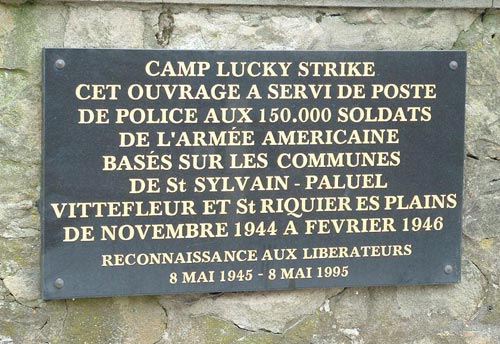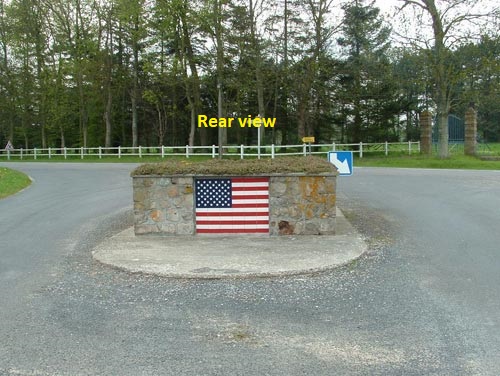Camp Lucky Strike Memorial Plaque
Details:
On the east side of the junction.
A rectangular black plaque with a French inscription in gold lettering. The plaque tells the significance of Camp Lucky Strike and honors the liberators. The camp’s location was not selected by chance, but rather because the occupying German troops had constructed an airfield there in 1940 with a landing strip 1800 meters long and 50 meters wide. This airfield was one of the defensive elements of the Atlantic Wall: surveillance and coastal defenses were also a perfect starting point for attacks on southwest England. V-1 rocket launching ramps were installed at the beginning of 1944 in the woods surrounding the airfield. It was heavily bombed by the British throughout the war, but especially during the fighting which followed the June 1944 landings. In September 1944 American Engineer Corps troops took control of the area, repairing the landing strips and constructing the camp.
The camp became the most important military camp in Europe. It extended over 600 hectares (1 hectare = approximately 2 ½ acres). It was a mandatory port of entry for practically every American soldier, and 1½ million was spent from a couple of days up to 18 months there. It was the principal camp used for repatriated soldiers and liberated POWs, but also as a reception station for soldiers on leave. It was also a staging area for the Pacific Theater and — until August 10, 1945 — for the invasion of Japan. There were 100,000 men in the camp each day — 100,000 men to lodge, feed, train, and entertain. (Regarding repatriation, there were 6,000 daily departures by plane or boat from Le Havre, the only port liberated on the western coast that could accommodate large ships.)
Camp Lucky Strike remained active until the end of 1945 and was officially closed in 1946.
Source of information: sites.google.com
Source of photos: tracesofwar.com
Monument Text:
CAMP LUCKY STRIKE
CET OUVRAGE A SERVI DE POSTE
DE POLICE AUX 150.000 SOLDATS
DE L'ARMIÉE AMÉRICAINE
BASÉS SUR LES COMMUNES
DE St SYLVAIN - PALUEL
VITTEFLEUR ET St RIQUIER ES PLAINS
DE NOVEMBRE 1944 A FEVRIER 1946
RECONNAISSANCE AUX LIBERATEURS
8 MAI 1945 - 8 MAI 1995
English translation:
CAMP LUCKY STRIKE
THIS STRUCTURE SERVED AS A POLICE STATION
FOR THE 150,000 SOLDIERS OF THE
OF THE AMERICAN ARMY
BASED ON THE MUNICIPALITIES
OF St SYLVAIN - PALUEL
VITTEFLEUR AND St RIQUIER ES PLAINS
FROM NOVEMBER 1944 TO FEBRUARY 1946
RECOGNITION TO THE LIBERATORS
MAY 8, 1945 - MAY 8, 1995


